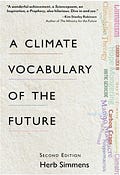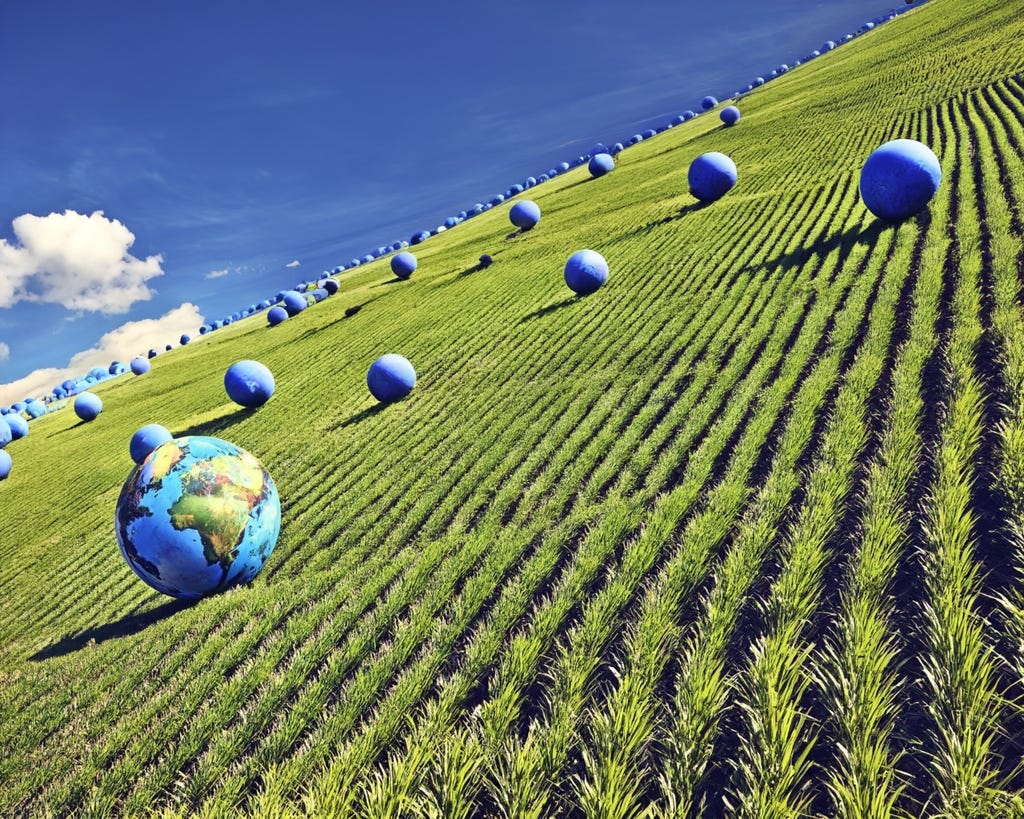Herb Simmons is a ‘planetarian’. I didn’t know that I was one too until I opened Herb’s A Climate Vocabulary of the Future. A planetarian is:
one who cares strongly about and identifies with the welfare of the planet
Herb offers up this word as an alternative to the term ‘environmentalist’, a term that some have invested with negative connotations. ‘Planetarian’ is a smart new edition to our vocabulary: who could say they don’t care about the future of the planet? It is one of those terms that is unarguable. As Herb writes, ‘caring for and protecting the planet is the job of all of us, not just those who label themselves or are labelled by others as environmentalists’.
We need more planetarians, because we are facing ‘planetary necrosis’ - the death or loss of irreplacable features of our planet, such as glaciers, many species and more. We also need more ‘possibilitarians’, a term for ‘pragmatic, non-ideological and determined people and institutions’. Possibilitarians will help us to work our way out of our old and dirty lifestyles. One new profession we definitely need is the ‘planitect’: a person trained in all aspects of planetary systems who works on climate mitigation, restoration and adaption.
Affluent societies have been on an ‘energy bender’. We now need something like 12-step ‘energy sobriety’ programs, where we rethink our relationship to energy, and the impact of the way we have consumed it on the planet and future generations. Delays in reducing our burningof fossil fuels mean we are on ‘borrowed climate time’, and will be hit by ‘procrastination penalties’. Of course, our kids and grandkids will be shouldering the greater burden of our ‘energy benders’.
Our governments are in a state of ‘carbon schizophrenia’. They expect us to live in their unrealities of unrealistic (because they are insufficient) national climate pollution reduction targets; AND live with ongoing un-real approvals for digging or pumping up or fracking more oil, coal, and gas, even when they know this is what is driving climate breakdown. This is a whole new level of nationwide gas-lighting (pun intended).
We are already in a ‘post-normal climate’, a climate that is ‘unpredictable, novel, often extreme and ever changing, almost always for the worse’. Herb offers this term as an antidote to the phrase ‘new normal’. I had not understood the problem with calling our fossil-fuelled climate the ‘new normal’. A ‘new normal’ is something you just have to adjust to. After all, it is what is now the norm. But ‘post-normal’ is a bitter reminder we are actively letting something so precious slip from our grasp.
Herb is not a linguist, but he has a real feeling for language - more than many card-carrying linguists it should be said. When he started this project, his plan was to curate a vocabulary of existing climate words. But as he did so, he ‘saw large gaps, even chasms, in the current climate language’. And ‘rather than attempting to ignore or vault over these chasms’, he ‘decided to begin filling them in’. He did this because he knows ‘the structures that exist in our languages profoundly shape how we construct reality’.
This point was the theme of a previous post, where I wrote that Language is not a truth machine, it’s a reality machine. In the fight for climate, understanding how language sets the terms of what we think is essential. As our planet and climate show deep signs of stress, the need to refashion how we talk and think to re-engineer reality becomes ever more urgent. For the linguists out there - this is our existential test. And it shows how utterly impoverished the project led by Chomsky for more than 50 years has been. What a waste. It has nothing at all to offer at this crucial juncture in the history of humanity.
Dust off your copies of Whorf people - we all need to re-read Whorf’s breathtakingly relevant work written across the 1930s and 1940s, even before the computer was invented: Language, Thought and Reality. The creative power of language is why Herb argues we should say ‘climate breakdown’ instead of ‘climate change’. And why he urges us to consider ‘global heating’ or even ‘global scorching’ in lieu of ‘global warming’. Words change minds.
In presenting this book, Herb quotes one of the great planetarians, Bill McKibben, the American environmentalist, author and activist, who argues that while obviously we need new and renewable energy technology, ‘most of all we need new metaphors’. Bill’s Substack, The Crucial Years, is what came to mind when I read Herb’s entry on Big Wisdom. Big Wisdom is about ‘the process of aggregating and integrating the wisdom that large numbers of people possess to gain insights that are beneficial to society’.
Herb’s book rises to this challenge of finding or coining the new words that help us understand our present and imagine something better. The book has over 1000 entries. I’ve showcased a small selection here. This is a book I plan to get to know better to develop my own climate vocabulary, and to return to at this little Substack.
It’s my 10th anniversary - not years :), this is my 10th post at Changing Language in the #ClimateCrisis. I think I’m starting to get the hang of it. Thanks to the 142 subscribers I’ve gained along the way - I’m totally chuffed. In two weeks time when the next post is due, I’ll be walking in the Warrumbungles National Park with a bunch of like-minded women. So see you in a month!






Awesome new vocab on this post - planetariums and possibilities. Thanks Annabelle for getting us thinking about the possibilities of the future and the power of language.
Enjoy your bushwalking adventure, sounds glorious. 🌱⛰️
Oh! I love possibilitarian and new normal vs post normal is very powerful! Thanks for sharing.